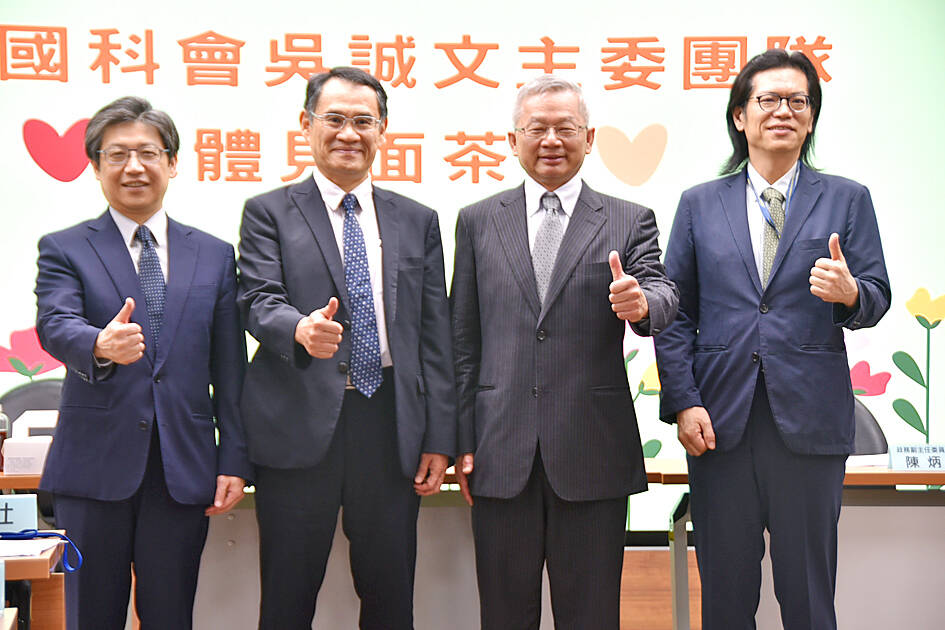The National Science and Technology Council (NSTC) yesterday said it plans to present new projects within three months that would facilitate the development of power devices used in electric vehicles (EVs) and energy converters to complete the missing piece in the nation’s semiconductor industry.
Aside from the 2-nanometer or 1.4-nanometer semiconductor process technologies, Taiwan also seeks to broaden its semiconductor coverage to include power devices, or power semiconductors, which are made using less advanced technologies, NSTC Minister Wu Cheng-wen (吳誠文) told his first news conference in office yesterday.
Power devices are a key component of energy converters used in smart grids and metal oxide semiconductor field effect transistors for EVs, the NSTC said.

Photo: Wu Po-hsuan, Taipei Times
The agency aims to build an extensive smart grid hardware supply chain that covers everything from semiconductor modules to systems, Wu said.
“Taiwan has not made a full effort to develop this segment. This is the missing piece in the nation’s semiconductor industry,” Wu said. “We are aiming to build our own supply of power devices to facilitate the development of smart grids and smart EVs.”
Wu said that his task is to fulfill President William Lai ’s (賴清德) goal of having a “balanced” industrial environment.
As Taiwan has built a robust technology industry, it should leverage the power of technologies such as artificial intelligence to facilitate the development of the traditional sector and “green” energy, among others, he said.
Less advanced 8-inch fabs can be used to produce power devices on mature technology nodes such as 25-nanometer and 65-nanometer technologies, NSTC Deputy Minister Lin Faa-jeng (林法正) said on the sidelines of the news conference.
“There is no need for all companies to develop advanced technologies,” Lin said.
As Taiwan is to usher in an energy environment abound with renewable energy systems, EV charging piles and power storage units, energy converters would be critical to connect solar or other sources of renewable energy to Taiwan Power Co’s (台電) grids, he said.
Power devices are the key component for energy converters, he added.
The NSTC would push for Taiwan to produce the silicon carbide and gallium nitride used to make power devices, Lin said.
Local power device makers are facing difficulties finding the optimal materials and improving their yield rate, resulting in high manufacturing costs, Lin said.
The NSTC plans to offer funding to local universities and colleges to work together with local semiconductor companies to improve power device manufacturing capabilities, Lin said, adding that detailed plans would be unveiled in three months.
In addition to power devices, the NSTC is seeking to collaborate with the Ministry of Economic Affairs to build “science parks” overseas with the assistance of friendly allies, helping smaller businesses to expand their manufacturing footprints globally, Wu said.
That would help mitigate a talent shortage and tight supply of power, he said.
Asked about Taiwan Semiconductor Manufacturing Co’s (TSMC, 台積電) plan to make advanced 2-nanometer chips in the US, Wu said the chip giant has promised to maintain a research-and-development center and its most advanced technologies at home.
TSMC now operates a 2-nanometer R&D center in Hsinchu and plans to ramp up production of 2-nanomter chips there as well as other sites in Taiwan, Wu said.
He said he believes TSMC has the ability to safeguard its corporate secrets and technological know-how.

The US dollar was trading at NT$29.7 at 10am today on the Taipei Foreign Exchange, as the New Taiwan dollar gained NT$1.364 from the previous close last week. The NT dollar continued to rise today, after surging 3.07 percent on Friday. After opening at NT$30.91, the NT dollar gained more than NT$1 in just 15 minutes, briefly passing the NT$30 mark. Before the US Department of the Treasury's semi-annual currency report came out, expectations that the NT dollar would keep rising were already building. The NT dollar on Friday closed at NT$31.064, up by NT$0.953 — a 3.07 percent single-day gain. Today,

‘SHORT TERM’: The local currency would likely remain strong in the near term, driven by anticipated US trade pressure, capital inflows and expectations of a US Fed rate cut The US dollar is expected to fall below NT$30 in the near term, as traders anticipate increased pressure from Washington for Taiwan to allow the New Taiwan dollar to appreciate, Cathay United Bank (國泰世華銀行) chief economist Lin Chi-chao (林啟超) said. Following a sharp drop in the greenback against the NT dollar on Friday, Lin told the Central News Agency that the local currency is likely to remain strong in the short term, driven in part by market psychology surrounding anticipated US policy pressure. On Friday, the US dollar fell NT$0.953, or 3.07 percent, closing at NT$31.064 — its lowest level since Jan.

The New Taiwan dollar and Taiwanese stocks surged on signs that trade tensions between the world’s top two economies might start easing and as US tech earnings boosted the outlook of the nation’s semiconductor exports. The NT dollar strengthened as much as 3.8 percent versus the US dollar to 30.815, the biggest intraday gain since January 2011, closing at NT$31.064. The benchmark TAIEX jumped 2.73 percent to outperform the region’s equity gauges. Outlook for global trade improved after China said it is assessing possible trade talks with the US, providing a boost for the nation’s currency and shares. As the NT dollar

The Financial Supervisory Commission (FSC) yesterday met with some of the nation’s largest insurance companies as a skyrocketing New Taiwan dollar piles pressure on their hundreds of billions of dollars in US bond investments. The commission has asked some life insurance firms, among the biggest Asian holders of US debt, to discuss how the rapidly strengthening NT dollar has impacted their operations, people familiar with the matter said. The meeting took place as the NT dollar jumped as much as 5 percent yesterday, its biggest intraday gain in more than three decades. The local currency surged as exporters rushed to